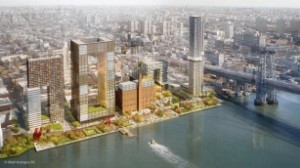Mayor de Blasio Flexing Muscles Over Domino Sugar Development
In what John H. Mollenkopf, director of City University’s Center for Urban Research says “is curtains up on the first act of the real-estate drama for the new administration” New York City Mayor Bill de Blasio is demanding more space for affordable housing to the $1.5 billion development proposal along the waterfront in Williamsburg, Brooklyn.
After more than 100 years as the anchor of a busy industrial strip, the Domino Sugar factory closed shop in 2004. After the

Community Preservation Corporation purchased the 11-acre property they spent six years creating a plan for development. Local politics and public approvals finally led to city officials rezoning the industrial area of Williamsburg for high-rise apartment buildings which led to a building boom in the area and the beginning of the process of gentrification.
Not good news for working class residents of Brooklyn, they complained that gentrification was increasing housing costs and pushing them out of their neighborhood. Community Preservation said they would keep the refinery building along with its iconic 40-foot sign, build an esplanade, a park, a school and 2,200 housing units with 30 percent, or 660 apartments reserved for low and middle class families.
Unfortunately the company fell on hard financial times and defaulted on its loans. In 2012 a new developer, Two Trees, took over the project and completely redesigned the buildings, enlarged the park space, added more office space for high-tech companies, and remained faithful to the promise of 660 reserved apartments for low to mid income families. These changes eased the fears of just about everyone who had been apprehensive about the project, and won neighborhood support for the project.
Now enters on to the stage the newly minted Mayor de Blasio, who wants even more affordable housing added to the project in exchange for the zoning changes that Jed Walentas, head of Two Trees, needs to proceed with the development. But Mr. Walentas is not thrilled with the changes the mayor is calling for threatening to go back to the original plan.
“I’d very much like to work this out with them” Mr. Walentas said on Thursday. “But what they’re currently asking for is not workable.”
New York housing activists, who support de Blasio, and the powerful real estate industry, who are worried about the new mayor’s populist stands, are both paying close attention to the fight over Domino.
One activist, Rob Solano, member of Brooklyn’s Community Board 1 and the executive director of Churches United for Fair Housing, both of which are supporters of the Two Trees scheme, says he is happy about the city’s “aggressiveness” in demanding more low-income housing. He hopes, however, the push will not cause the project to be delayed or derailed.
“It’s a delicate balance between pushing as hard as you can and a break” Mr. Solano said. “If we get to the point where nothing is built, or there are more delays, that’s another day without affordable housing.”
